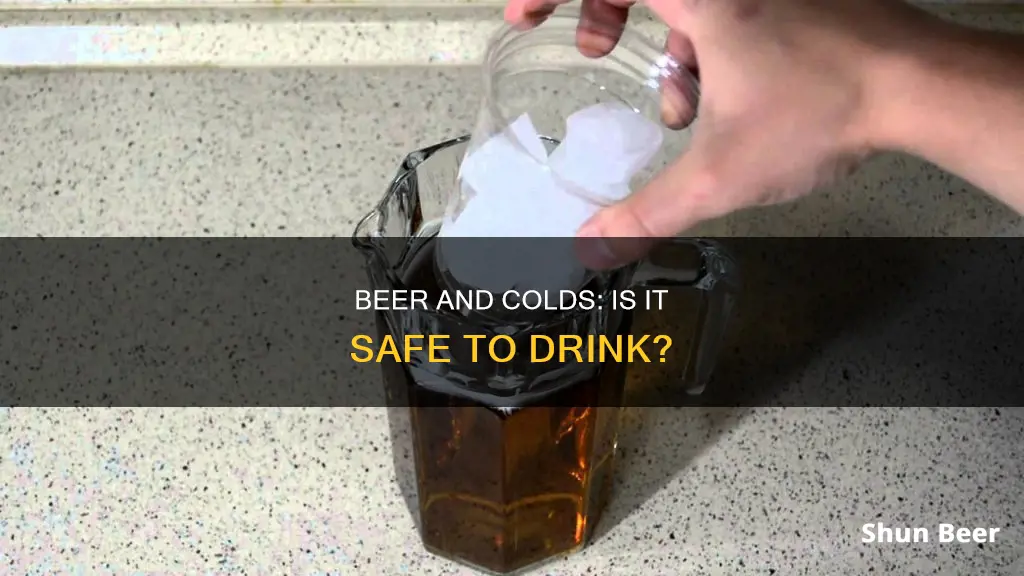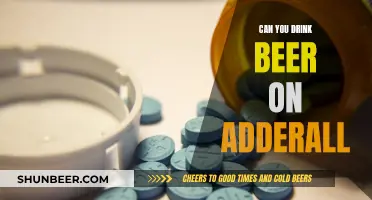
Drinking alcohol when you're sick is generally not recommended by health authorities. Alcohol can weaken your body's ability to fight off infection, prolonging the recovery process. It can also cause dehydration, which can worsen congestion. However, some studies suggest that moderate alcohol consumption may reduce the number of colds people get per year, possibly due to its effects on the immune system. So, can you drink beer with a cold? While there is limited evidence that moderate alcohol consumption may have some benefits, it is important to remember that excessive alcohol consumption is harmful to health and can increase the risk of infection.
What You'll Learn

Alcohol may reduce the number of colds per year
While there is no cure for the common cold, some studies suggest that drinking a small amount of alcohol may reduce the number of colds people get per year. However, it is important to note that excessive alcohol consumption is highly damaging to human health and increases the risk of infection.
A 2012 retrospective study of 899 males in Japan found that participants who did not drink alcohol were more likely to experience two more episodes of the common cold during the study than those who drank 11.5 to 35.8 grams of alcohol per day. This amount of alcohol is equivalent to 1 to 2.5 drinks per day in the United States. The study also found that the frequency, not the amount, of alcohol intake was significantly related to a lower prevalence of self-reported common cold episodes.
Similarly, a 2002 study in Spain followed 4,300 healthy adults and found that drinking 8 to 14 glasses of wine per week, particularly red wine, was linked to a 60% reduction in the risk of developing a cold. The scientists suspected this had something to do with the antioxidant properties of wine.
Additionally, a 1993 study by researchers at Carnegie Mellon found that resistance to colds increased with moderate drinking, except in smokers.
However, it is important to note that alcohol cannot treat or cure a cold. Health authorities generally do not recommend drinking alcohol during a cold, as it can have negative effects on the immune system and may increase congestion.
Beer and Dieting: Can You Have Your Cake and Drink, Too?
You may want to see also

Drinking alcohol can dehydrate you
Drinking alcohol can lead to dehydration, a condition that occurs when the body lacks sufficient fluids to function effectively. Alcohol is a diuretic, which means it increases the rate at which your body removes fluids through your renal system, including the kidneys, ureters, and bladder. This can result in dehydration if you don't consume enough water along with alcohol.
- Drinking on an empty stomach: When you drink on an empty stomach, alcohol is absorbed directly into the bloodstream through the blood vessels in the stomach lining and small intestine. This direct absorption can lead to faster dehydration.
- Alcohol in the bloodstream: Once alcohol enters your bloodstream, it can travel throughout your body, including your brain, impairing your judgment and motor skills. This absorption can also lead to dehydration.
- Alcohol metabolism: Your body metabolizes alcohol slowly, turning it into nutrients and energy at a rate of about one drink per hour. This slow process allows alcohol to accumulate in your system, impacting your body's fluid balance.
- Alcohol as a diuretic: When processed by the liver, alcohol is converted into acetaldehyde, which can be toxic in high doses. The liver then converts acetaldehyde into acetate, removing it from the body. This process reduces the production of vasopressin, an antidiuretic hormone that helps the body retain water. The decrease in vasopressin exacerbates the diuretic effect, leading to dehydration.
- Appetite suppression: Consuming large amounts of alcohol can suppress your appetite, making you less likely to eat while drinking. This can speed up alcohol absorption and contribute to dehydration.
- Kidney function: Alcohol impairs the kidneys' ability to filter blood and maintain fluid and electrolyte balance. The decreased kidney function, combined with reduced vasopressin levels, further enhances the diuretic effect, resulting in increased urination and fluid loss.
Preventing and Counteracting Alcohol-Induced Dehydration
To prevent and counteract dehydration while consuming alcohol, consider the following:
- Moderation: Consume alcohol in moderation. The Centers for Disease Control and Prevention (CDC) recommends a maximum of two drinks per day for males and one drink per day for females.
- Slow drinking: Drink slowly to allow your liver to process the alcohol. It takes the liver about one hour to process each serving of alcohol.
- Water consumption: Drink water along with alcohol. Aim for at least one glass of water for each serving of alcohol. This helps to replenish fluids and prevent dehydration.
- Hydrating beverages: In addition to water, consume other hydrating beverages, such as electrolyte-fortified water or sports drinks, which can aid in rehydration.
- Avoid sugary and caffeinated drinks: Sugary and caffeinated beverages can promote dehydration, so it's best to avoid them when trying to stay hydrated.
- Eat hydrating foods: Include foods with high water content, such as watermelon, cucumbers, and oranges, in your diet. These foods can help maintain hydration levels.
- Avoid fried and high-sodium foods: Fried foods and those high in sodium, protein, and sugar can contribute to dehydration, so it's best to limit their consumption.
Beer and GERD: What You Need to Know
You may want to see also

Alcohol can negatively impact your sleep
Secondly, alcohol interferes with your circadian rhythm, which regulates your sleep-wake cycle. It decreases your body's sensitivity to cues like daylight and darkness, which are essential for triggering shifts in body temperature and the release of the sleep hormone melatonin. This disruption can make you feel alert when you want to sleep and sleepy when you want to be awake.
Thirdly, alcohol can contribute to the development of insomnia, a sleep disorder characterized by difficulty falling and staying asleep. Individuals with insomnia are more likely to turn to alcohol as a sleep aid, creating a destructive pattern where they drink to fall asleep but then experience poor sleep, leading to increased sleepiness during the day.
Lastly, alcohol can aggravate snoring and sleep apnea, a disorder characterized by repeated pauses in breathing during sleep. Alcohol causes physiological changes, such as relaxing throat muscles and increasing airway resistance, which can worsen sleep apnea symptoms and disrupt sleep.
Morphine and Beer: A Dangerous Mix?
You may want to see also

Alcohol may worsen cold and flu symptoms
Drinking alcohol when you have a cold is generally not recommended by health professionals. While a drink or two may not be harmful, excessive alcohol consumption can have a detrimental impact on your health and increase the risk of infection.
Weakened Immune System
Alcohol can weaken your immune system, making your body less able to fight off infections. This means that drinking alcohol when you're sick can prolong your recovery and make you more susceptible to getting sick again.
Disrupted Sleep
Although a glass of wine may help you fall asleep, alcohol disrupts REM sleep, the most restorative type of sleep. As a result, you may feel groggy and more fatigued the next day. Disrupted sleep can also slow down your recovery from a cold or flu.
Dehydration
Alcohol is known to be dehydrating, and this can worsen congestion, a common symptom of colds and flu. Dehydration can also negatively impact your overall health and make it harder for your body to recover from illness.
Interaction with Medication
If you're taking any medication for your cold or flu, alcohol can interact with it and cause negative side effects. For example, combining acetaminophen, a common pain reliever and fever reducer, with alcohol can lead to liver damage. Always check with your doctor or pharmacist before consuming alcohol with any medication.
Congestion
While some people believe that alcohol can act as a decongestant, research suggests otherwise. A 2022 study found that alcohol consumption led to decreased nasal volume and increased airway resistance, indicating that it may contribute to congestion rather than providing relief.
In conclusion, while there is limited evidence that moderate alcohol consumption may reduce the frequency of colds, drinking alcohol when you're already sick is generally not advisable. It's important to prioritize rest, hydration, and, if needed, over-the-counter medications to help manage your symptoms and support your body's recovery process.
Beer and Amox-Clav: Is It Safe to Drink?
You may want to see also

Drinking alcohol in cold weather can be lethal
Drinking alcohol in cold weather can be dangerous, and in some cases, even lethal. Here's why:
When you drink alcohol, it causes the blood vessels just below your skin to open up, allowing more blood and heat to flow into them. This process draws blood and heat away from your vital organs, and while your skin may feel warm, your body core is actually losing heat. In cold weather, this effect can be even more pronounced, and the loss of heat from your core can lead to a dangerous drop in body temperature, known as hypothermia. Hypothermia is a life-threatening condition that requires immediate medical attention.
Alcohol also impairs your decision-making ability and affects your balance and coordination. This impairment can lead you to take unnecessary risks, such as walking home without a jacket in snowy weather, which further increases the risk of hypothermia. Additionally, the reduced coordination caused by alcohol can make tripping or falling more likely, especially on icy or slippery surfaces.
Furthermore, alcohol can worsen cold symptoms and prolong your recovery. It weakens your immune system, making it harder for your body to fight off the infection. Alcohol can also interrupt your sleep, which is crucial for recovery. It disrupts REM sleep, the most restorative type of sleep, leaving you feeling groggy and tired.
In addition to these risks, consuming alcohol during cold weather can lead to dehydration, which can further exacerbate congestion and worsen cold symptoms. It is important to prioritize your health and well-being by avoiding alcohol when dealing with a cold, especially in cold weather conditions.
Beer After a Colonoscopy: What You Need to Know
You may want to see also
Frequently asked questions
Drinking alcohol when you have a cold is not recommended by health professionals. Alcohol can weaken your immune system, impair your sleep, and make you more susceptible to infections.
Drinking alcohol can weaken your body's ability to fight off infections. Alcohol can also cause long-term inflammation throughout the body, alter your gut flora, damage the intestinal lining, and impair the function of immune cells in the respiratory tract.
While a glass of wine might help you fall asleep, alcohol is disruptive to getting a good night's rest. Alcohol disrupts REM sleep, the most restorative type of sleep, and can leave you feeling groggy in the morning.
Yes, drinking alcohol when you have a cold can increase congestion. Alcohol can also dehydrate you, making congestion worse. Additionally, if you are taking any cold medication, alcohol may negatively interact with it.







